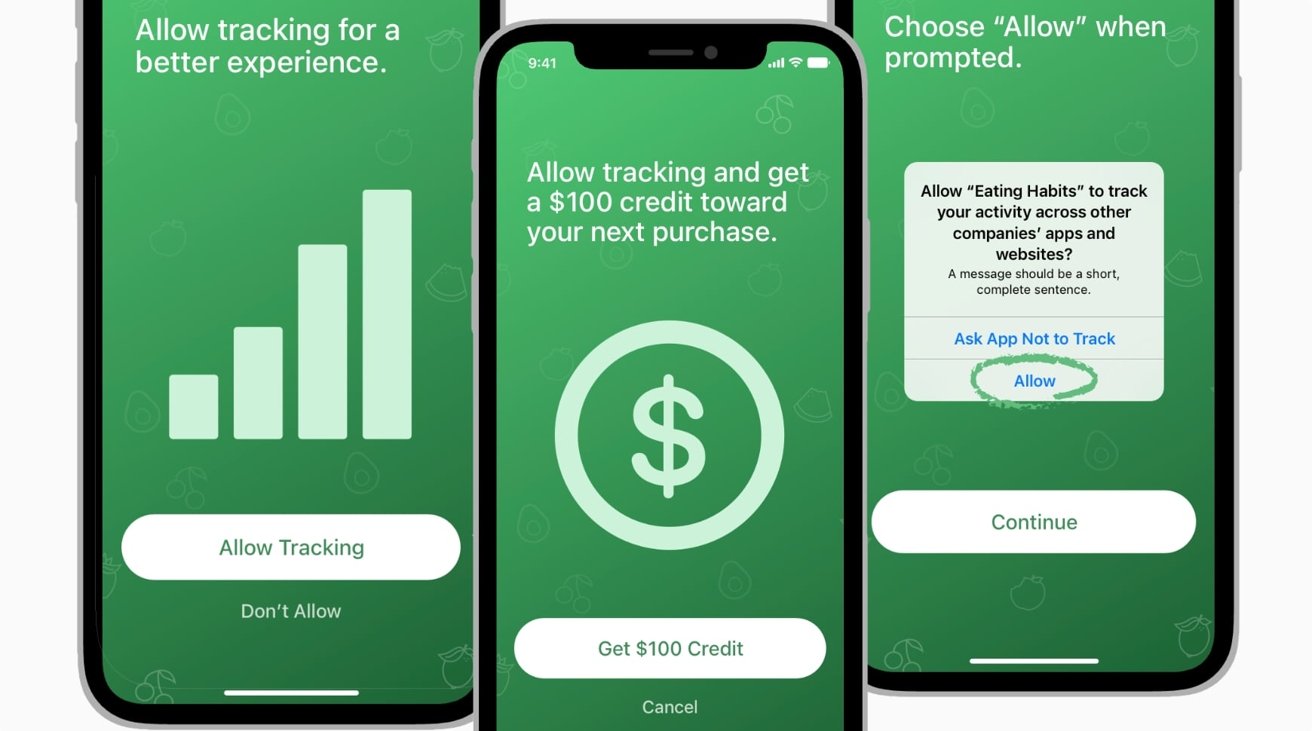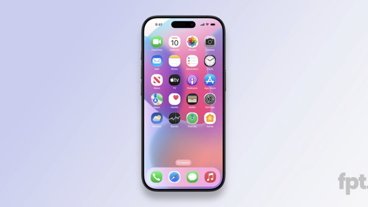App developers cannot bribe users into allowing tracking within an app, Apple has warned, with apps prevented from performing a number of actions to try and influence what a user selects in the App Tracking Transparency notification.
As part of the introduction of App Tracking Transparency, Apple's feature to give users the chance to prevent specific apps from tracking their online activities for advertising purposes, Apple has written guidelines for developers to follow. As part of these guidelines, Apple lists things apps cannot do to convince users into enabling tracking in the ATT notification.
Within the Human Interface Guidelines of Apple's Developer site, specifically under "Accessing User Data," Apple has included a section explaining elements that developers cannot do in tandem with tracking requests. As reported by MacRumors, this includes outright bribery of a user.
"Don't offer incentives for granting the request," writes Apple, with developers unable to "offer people compensation for granting their permission." Developers also cannot "withhold functionality or content or make your app unusable until people allow you to track them."
Developers are also prevented from displaying a pre-alert message mirroring the functionality of the system alert, including the creation of a button that uses "Allow" or similar terminology in a pre-alert screen. It is also forbidden for apps to show an image of the alert itself in a modified form, such as a picture highlighting the "Allow" option.
Apps are allowed to display a pre-alert screen to convince users to allow tracking, but ideally to explain additional details as to why the user should allow it to happen, such as for advertising that matches their interests. The screen also must have only one button to bypass it and bring up the system alert, with that button using terms like "continue" or "next."
All apps submitted to the App Store must have App Tracking Transparency enabled, if applicable, since April 26. Apple has previously warned developers that any apps found trying to circumvent ATT will be rejected from the App Store.
Stay on top of all Apple news right from your HomePod. Say, "Hey, Siri, play AppleInsider," and you'll get latest AppleInsider Podcast. Or ask your HomePod mini for "AppleInsider Daily" instead and you'll hear a fast update direct from our news team. And, if you're interested in Apple-centric home automation, say "Hey, Siri, play HomeKit Insider," and you'll be listening to our newest specialized podcast in moments.
 Malcolm Owen
Malcolm Owen

-m.jpg)






 Oliver Haslam
Oliver Haslam
 Thomas Sibilly
Thomas Sibilly
 Marko Zivkovic
Marko Zivkovic

 Wesley Hilliard
Wesley Hilliard

 Andrew Orr
Andrew Orr



-m.jpg)






11 Comments
This is where, IMHO, Apple could get into trouble with the Antitrust people. While an argument can be made about bribing people, I’m not sure how Apple can justify not allowing developers to limit functionality if a user chooses not to allow tracking. Since the developer would make at least some of their income from the targeted ads, not allowing developers to limit functionality would be similar to not allowing in-app purchases. The only difference is with the in-app purchase, the developer earns money directly from the user and with add tracking it would be indirectly through the sales of advertising. Perhaps a better method would be to have three clearly explained choices. One - do not track me which could result in limited functionality, Two - allow the App to track me and use my information as “currency” for full functionality and Three - do not track me and pay an in-app purchase in real currency for full functionality. For the record, I am very happy Apple has gone the route of standing up for the users. To me, the entire idea of stealth tracking should be banned by the government. Users must be given the choice to allow tracking or not. My worry is that some of the current antitrust rhetoric will harm the user by limiting Apple’s ability to enforce certain App Store rules.
Apple’s goal seems to be preventing developers from creating a two tiers. One with advertising and tracking opt-in and the other a paid tier.
I don't think Apple can win this battle, legally or morally. What happens between a consumer and a corporation outside of the iPhone is not something Apple should try to control.
Companies have other ways to bribe users other than money. For example, FaceBook could offer lower latency to people who have permitted third party tracking. Faster response time is "a higher level of service" that FaceBook can offer to people who "provide more value to FaceBook," which is certainly the case when people allow FaceBook to track them. Providing such a choice of services levels would be far less evil that FaceBook's usual level of evil.
I'm not sure how Apple can stop a company from providing better (e.g., faster) services to individuals who offer them more information about their identities.
One person's "bribery" is another person's "contract."